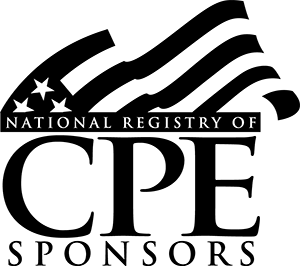What Sponsors Need to Know
MY COMPANY WAS SELECTED FOR A RANDOM COMPLIANCE AUDIT. DO YOU HAVE TIPS OR RECOMMENDATIONS ON HOW TO SUCCESSFULLY PASS THE COMPLIANCE AUDIT?
The purpose of the compliance audit is to confirm the responses provided to NASBA during the most recently submitted certification online renewal. Over the course of several audit cycles, we’ve noticed several common audit deficiencies. Let’s take a look at these deficiencies so you can remain compliant with the CPE Standards.
1. Omission of Course Descriptive Information (promotional material)
Sponsors are required to provide descriptive information that enable the CPA to assess the appropriateness of learning activities. This information must be disclosed in advance to participants. Did you know that there are different requirements for promotional material if the audience consists of internal employees versus and external participants? Please be sure to review these differences and submit the appropriate documentation.
The NASBA reviewer expects to see all requirements on the promotional material. Does it all have to be on one document? No, it’s acceptable to have the information in different formats such as a brochure and a website, but make sure you submit the brochure and provide a link to the website. For more details, please review Standard No. 12.
2. Omission and/or Inadequate Information Regarding Bibliographic Data
Learning activities must be developed and reviewed by individuals or teams that are subject matter experts. Sometimes sponsors list all team members involved in the development and review process, but do not specifically identify the instructor or reviewer. On other occasions, sponsors exclude information regarding the qualifications and/or licensee information for such individuals.
Did you know that the participation of at least one licensed CPA (active and in good standing in a United States jurisdiction) is required in the development of every program in accounting and auditing? Also, at least one licensed CPA, tax attorney, or IRS Enrolled Agent is required in the development of each program in the taxes field of study classification. To confirm their qualifications, accurate and adequate bibliographic material is necessary. Please review Standard Nos. 4, 5 and 24 for additional information.
3. CPE Calculation Errors
Sponsors who provide continuing professional education credits to multiple audiences frequently calculate CPE credits incorrectly. For example, a sponsor who offers continuing legal education will submit a certificate of completion based on 60 minutes. Another common CPE calculation error is failure to round down. Finally, sponsors are encouraged to only count learning content portions of programs for CPE credits. CPE credits should not be counted toward breaks, housekeeping instructions and excessive welcomes/introductory remarks. Please review Standard No. 16 for additional information.
4. Inadequate CPE Measurement Documentation
Sponsors are required to monitor individual attendance at group programs to assign the correct number of CPE credits. Sponsors will submit registration lists as supporting attendance verification. In this situation, the NASBA reviewer is unable to determine how the list is used to verify attendance. If the supporting attendance documentation contains little explanation, the sponsor should clearly explain the attendance monitoring policies and how the documentation supports those policies. Please see Standard No. 16 for additional information.
5. CPE Program Reporting Issues
Sponsors must provide program participants with documentation (electronic or paper) of the participation. Sponsors frequently omit key components that must be included on this documentation. Since Boards of Accountancy typically only review the certificate of completion, incomplete information may result in a denial of CPE credits. Please review Standard No. 23 for additional information.

